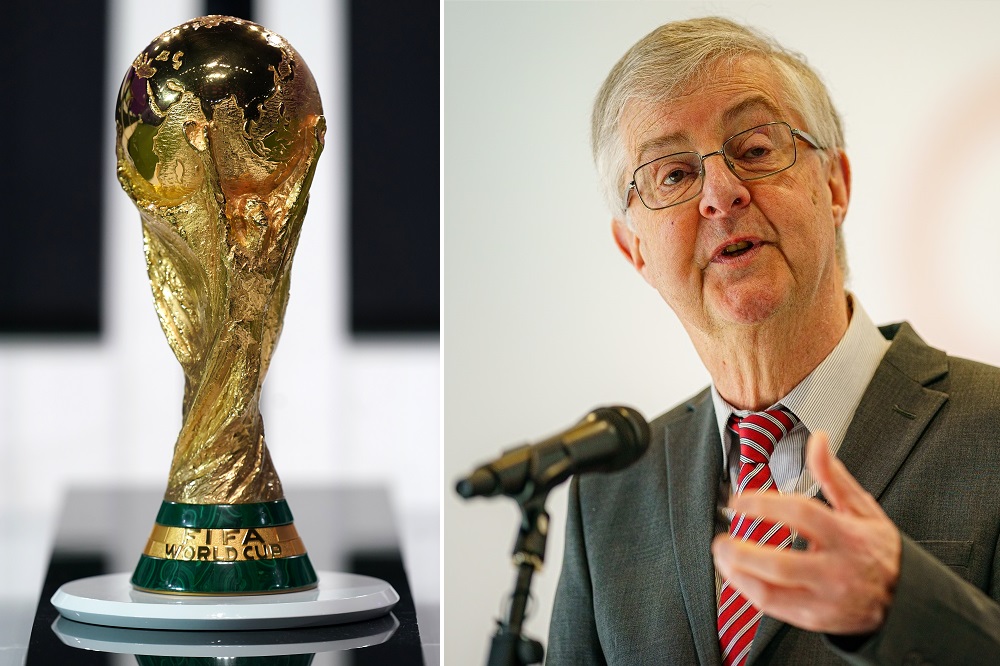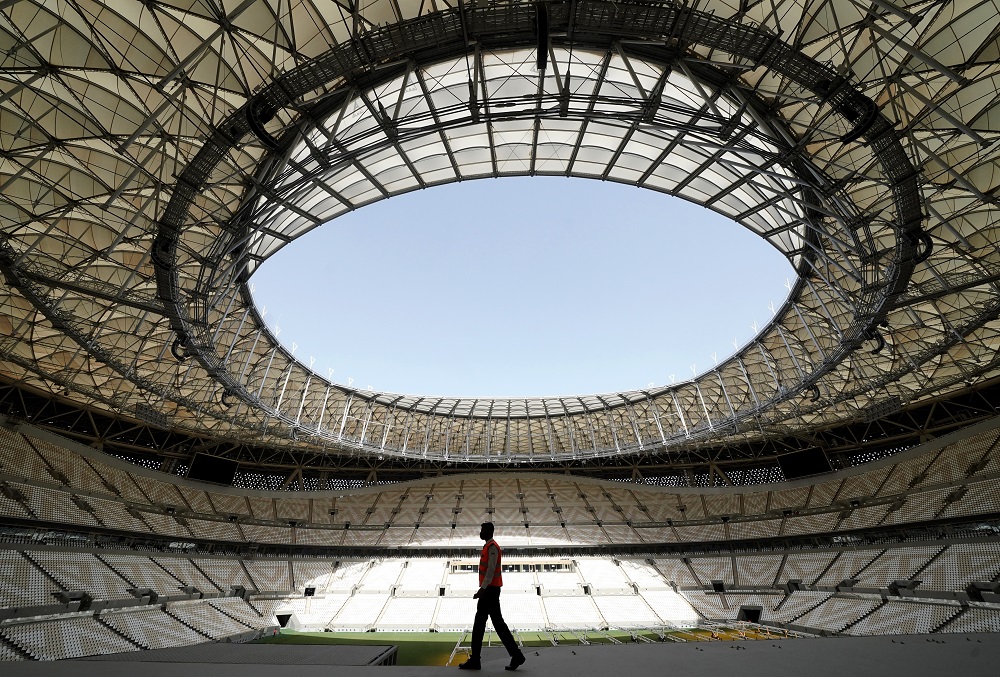Deputy head of global trade union movement backs First Minister’s Qatar visit – if he raises rights abuses

Luke James
The Welsh deputy head of the global trade union movement has backed the First Minister’s decision to travel to the World Cup in Qatar – if Mark Drakeford raises rights abuses with the host nation.
Drakeford is to personally lead the Welsh Government’s delegation to the World Cup despite senior figures in the UK Labour party refusing to attend and calls from Plaid Cymru and the Liberal Democrats for him to join the boycott.
In an interview with Nation.Cymru in Brussels, the deputy general secretary of the International Trade Union Confederation, Owen Tudor, said: “Trade unionists go to Qatar to talk to the Qatari government, we have a formal review process with them. I can’t see under what grounds we would say no to [the First Minister] going.
“We would say that if you are going then you should obviously raise with the Qatari authorities the need to maintain progress, don’t just go and sip tea. I know he would talk to the Qataris on these issues and he made it very clear he would.”
Tudor, whose roots are in Cardiff, took part in a meeting with the First Minister and the Football Association of Wales last week to give the ITUC’s assessment of the state of workers’ rights in Qatar and what approach the Welsh Government and FAW should take to the tournament.
“There are some countries which have always known they were going to the Qatar World Cup and there are others who didn’t and are therefore having to move very fast to work out where they are on this issue,” he said of the meeting.
“I think we were all agreed that the right thing to do is to say progress has been made: Kafala has been ended, health and safety is improving, workers’ rights are improving, the minimum wage has been introduced.
“But after the tournament, we will need to keep an eye on what’s going on and keep the pressure on to maintain the progress. What we’re talking about is maintaining progress, not maintaining where we’ve got to.
“That represents the Welsh Government’s line. That’s what Mark Drakeford was saying to us. That’s the line we would support, we would endorse that approach.”

‘Enormous impact’
Drakeford’s decision to attend came under renewed fire in the Senedd this week, with Plaid Cymru leader Adam Price calling on the First Minister “to stand in global solidarity with LGBTQ+ people everywhere by reconsidering his decision to attend the World Cup in Qatar.”
Welsh Liberal Democrat MS Jane Dodds has also called on the First Minister to cancel the trip, accusing Welsh Labour of being “happy to ignore the fact thousands of migrant workers have died in Qatar including in the construction of the World Cup stadiums in order to seek out investment.”
Tudor, who as head of the health and safety and then international departments of the UK TUC before becoming ITUC deputy general secretary in 2018 is a veteran of the “play fair” campaigns to improve human rights around World Cups, said corruption in FIFA has “had an enormous impact on the working conditions aspects of major football events.”
“If you’re making the decision based on whether you get a Rolex you’re less likely to be bothered about whether the people working on stadiums are going to have their health and safety protected,” he said.
The ITUC estimated in 2015 that 7,000 workers would lose their lives in preparing the World Cup in Qatar, a claim that the country’s authorities called “groundless” and a “deliberate distortion of the facts.”
Tudor said the projection has not been realised due to improvements in workers’ rights but insisted it was “in the right order of magnitude” at the time.
He said: “I think some people are still using those figures even though actually those figures are now wrong because we’ve done the build-up to the World Cup and the number has gone down. But the number only went down because of what we did.”
Fifty workers lost their lives in 2020 and over 500 were severely injured, according to the first study that the International Labour Organisation has been able to carry out as part of the country’s labour reforms.
But Tudor, as well as human rights activists like Amnesty International, say there remain many unexplained deaths in the previous decade.
He said: “The initial response [from Qatar] was you’re just making it up, it’s complete speculation. And they gradually moved down towards: Well, they’re not all work-related.’
“Apparently a lot of people from Nepal would develop a heart condition and then go to Qatar to work in the construction industry and therefore their death wasn’t anything to do with the construction, it was to do with their pre-existing medical condition. I don’t think lots of people with pre-existing medical conditions would go to work on construction sites in another country.
“By the time we entered into serious negotiations, they were no longer disputing the overall figures, they might still have been having arguments about what the figures represented.”
‘Better’
The ITUC’s campaign saw it served with legal challenges, denial of service attacks on its website and at least one attempt to break into its IT system, Tudor said.
It wasn’t until 2018, ten years after the World Cup was awarded to Qatar, that the country began implementing the labour reforms called for by trade unions and campaigners.
They included an end to the infamous Kafala system which prevented workers from changing employers or even leaving the country, as well as the introduction of a minimum wage, rules on working in high temperatures, labour tribunals and inspections. Trade unions are though still prohibited.
“The World Cup in Qatar gave us the leverage to raise these issues and push to get Kafala outlawed in Qatar and our argument would be that this has been achieved,” said Tudor.
“We have been extending the anti-Kafala campaign to other parts of the Gulf states to try and make the same moves there that we have in Qatar.
“Certainly Qatar is by no means a good place to work at the moment but it’s a lot better than it was 10 years ago when we started campaigning on the issue.”
The ITUC is concerned that it will be more difficult to ensure progress continues once the attention attached to the World Cup fades away.
“We’re absolutely not saying that Qatar has reached a stage now which is OK as long as it doesn’t slip back,” said Tudor. “It hasn’t reached that stage yet, it’s got a way to go before you even get to that stage.
“We need to work out ways to ensure the employers don’t slide back and that the government keeps the employers’ noses to the grindstone in terms of improving things and that’s going to be more difficult after the World Cup once the spotlight has gone.”

‘Never over’
But Tudor cites an extraordinary story as a reason to believe the country are unlikely to backslide on the reforms made – at least in legal terms.
“We can probably rely on the fact that the people who run Qatar are now convinced that this is the way they need to go in terms of becoming a modern country, “he said.
“Just as an example of how far they’ve changed and one of the things that gave us some confidence: when the Taliban rolled back into control of Kabul it was actually the Qataris who got most of our trade union people out of Afghanistan.
“The relationship was close enough that they would actually put themselves out to negotiate with the Taliban to get the trade union leaderships out of Afghanistan.”
He said the relationship had been built up through the ITUC’s willingness to publicly welcome reforms rather than “shove it in our back pocket and demand something new.”
It’s an approach that has resulted in criticism. French football journalist Philippe Auclair last month accused the ITUC of having “turned almost suddenly from the fiercest of Qatar’s critics to quasi-apologists of the emirate.”
Asked about those attacks, Tudor hit back: “The thing that makes us slightly annoyed is that journalists that wouldn’t take any bloody notice when we were doing the campaign aspect of it to say this is terrible, this is awful, are now turning round and saying: ‘How could the ITUC accept this, it’s still awful there.’
“But every so often you have to settle on a wage deal, that this is where you’ve got to, shake hands. Yeah, in two or three years you might come back for another wage rise and another dispute, it’s never over – it’s always a process rather than an end state.
“It wasn’t exactly collective bargaining talking to the Qataris but it is essentially analogous. One of the points of collective bargaining is that you eventually reach a bargain and the fact that it’s bargaining means it isn’t 100 per cent what you wanted.
“We will drive the hardest bargain we think we think will actually achieve something for people. I have talked to Qatari workers and they said it’s clearly still not perfect but it’s so much better than it used to be. And we did that, the global trade union movement did that.”
Support our Nation today
For the price of a cup of coffee a month you can help us create an independent, not-for-profit, national news service for the people of Wales, by the people of Wales.






The UK is in fairly rapid decline. PM Sunak must raise taxes, cut pensions, get a piece of windfall tax from the big companies (but not too much, for investment sake) and ensure the price caps come off in April. So FM Drakeford, as a tiny flea in UK, will have zero influence on anything outside Wales. If it was me, I would keep my head down, look to investment for coal and steel, as well as farming and that very secret side of Cymru:
fishing.